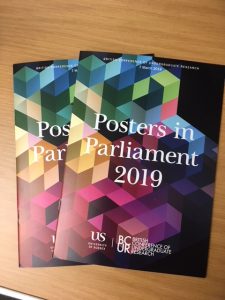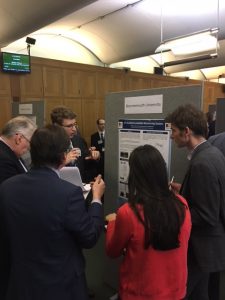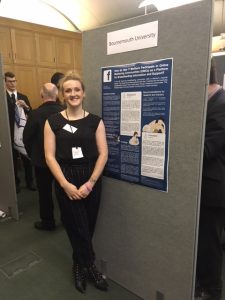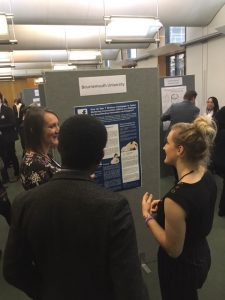This week we’ve got the government’s international education strategy alongside data that shows the value of international students to the UK. We’ve got a consultation on dropping BTECs, some less than impressive data on educational attainment, more campaigning on essay mills and of course, our take on the B word. And SUBU’s Sophie Bradfield explains why there have been posters all over campus with a note about the SUBU elections.
International Students
The Government published their International Education Strategy over last weekend. This publication was announced the Spring Statement by Philip Hammond and is co-authored by the DfE and DFIT. The strategy sets out 5 cross-cutting strategic actions, developed through consultation with the education sector:
- Appoint an International Education Champion to spearhead overseas activity.
- Ensure Education is GREAT promotes the breadth and diversity of the UK education offer more fully to international audiences.
- Continue to provide a welcoming environment for international students and develop an increasingly competitive offer.
- Establish a whole-of-government approach by implementing a framework for ministerial engagement with the sector and formalised structures for coordination between government departments both domestically and overseas.
- Provide a clearer picture of exports activity by improving the accuracy and coverage of our annually published education exports data.
Other specific actions include, encouraging sector groups to bid into the £5 million GREAT Challenge Fund to promote the entire UK education offer internationally and extending the period of post-study leave for international student visas, considering how the visa process could be improved for applicants and supporting student employment.
These actions are aimed to underpin the following objectives:
- Drive ambition across the UK education sector: The Government pledge to work in tandem with the education sector, and provide the practical solutions and tools it needs to harness its full international potential.
- Increase Education Exports to £35bn by 2030: Achieving this ambition will require an average annual growth rate of 4% per year. In order to drive progress against this target, the Government intend to build global market share in international students across the education sectors. They also intend to improve how we capture education exports data in order to monitor our progress against this ambition.
- Grow the numbers of international higher education students studying in the UK to 600,000 by 2030.
The full Government press release can be viewed here.
- Education Secretary Damian Hinds said: As we prepare to leave the EU it is more important than ever to reach out to our global partners and maximise the potential of our best assets – that includes our education offer and the international students this attracts.
- International Trade Secretary Dr Liam Fox MP said: Our education exports are ripe for growth, and my international economic department stands ready to engage and support UK providers from across the education sector to grow their global activity as we implement this new International Education Strategy.
- English UK chief executive Sarah Cooper said: “We are excited by the opportunities this bold strategy outlines, both for the promotion of the UK as the premier destination for English language learning, but also the support planned for growing the export of UK ELT quality and expertise to countries across the globe.”
- Dr Greg Walker, Chief Executive of MillionPlus, said: “Universities are critical export earners for the UK and greatly expand our soft power globally. This new strategy shows welcome recognition and ambition from the government towards strengthening our status as an attractive destination for international students. A better post-study work offer will boost the economy and benefit businesses needing high level skills, while a new target for international student recruitment is also the right step.
- Professor Dame Janet Beer, President of Universities UK, said: “I strongly welcome the publication of this strategy as a signal of a change in direction. I particularly welcome the ambitious target to grow the number of international students to 600,000 by 2030 which sends a strong message of welcome.
HEPI published a response:
- The overall trajectory for desired growth is actually lower than that assumed by the last Government target. It is also, at 4% a year, much lower than elsewhere – Australia has been enjoying an annual growth rate of over 17%.
- We are currently very badly off the trajectory to hit this last target, which shows that setting targets far from guarantees success. As page 5 of the new paper makes clear, instead of hitting the target set in 2015 of £30 billion in education export earnings by 2020, we are only currently on course to be on £23 billion by then.
- Although the new target is less ambitious than the old one and way below what has been achieved in other countries, we can still only hit the new 2030 target if we perform better in the future than in every recent year.
- In 2017/18 there were 458,000 overseas students studying at UK universities; 20% of the total student population, 54% of full-time taught postgraduates and 49% of full-time research degree students. 139,000 were from the EU and 319,000 from elsewhere.
- The top sending countries for overseas students have changed over the last few years. China currently sends the most students to the UK, more than 76,000 in 2017/18; the number of Chinese student in the UK has risen by 43% since 2011/12.
- There has been a general drop in entrants from the major EU countries since 2011/12; Ireland down by 41%, Germany 18%, Greece 16% and France 11%. Italy was the exception with numbers up by more than half.
- In recent years, the UK has been the second most popular global destination for international students after the USA. In 2016 the US took 28% of higher education students
- To hit the new target we would clearly need some new policies even if things like Brexit didn’t threaten current successes. While today’s paper is open about being the start of a new journey, it doesn’t include policies of the scale needed to guarantee success – the section on further education, for example, is particularly unambitious.
The HoC library has published FAQs about international students and EU students in the UK.
- In 2017/18 there were 458,000 overseas students studying at UK universities; 20% of the total student population, 54% of full-time taught postgraduates and 49% of full-time research degree students. 139,000 were from the EU and 319,000 from elsewhere.
- The top sending countries for overseas students have changed over the last few years. China currently sends the most students to the UK, more than 76,000 in 2017/18; the number of Chinese student in the UK has risen by 43% since 2011/12.
- There has been a general drop in entrants from the major EU countries since 2011/12; Ireland down by 41%, Germany 18%, Greece 16% and France 11%. Italy was the exception with numbers up by more than half.
- In recent years, the UK has been the second most popular global destination for international students after the USA. In 2016 the US took 28% of higher education students
The Higher Education Policy Institute (HEPI) and Kaplan International Pathways (Kaplan) published new research commissioned from London Economics on the financial contributions of international students who graduate from higher education and stay in the UK to work.
In September 2018, the Migration Advisory Committee failed to recommend the creation of a new post-study work visa, at least until there is “a proper evaluation, by us or others, of what students are doing in the post-study period and when they move onto other work permits.”. The HEPI / Kaplan report shows the tax and National Insurance payments of just one cohort of international students who stay in the UK to work after their studies amounts to £3.2 billion. This is made up of:
- over £1 billion in income tax;
- over £700 million in employees’ National Insurance Contributions;
- over £800 million in employers’ National Insurance Contributions; and
- nearly £600 million in extra VAT payments.
Graduates from other EU countries who stay here to work contribute £1.2 billion and graduates from the rest of the world contribute £2.0 billion.
The analysis additionally shows international graduates who find employment in the UK typically do so in sectors that suffer from acute skills shortages. Rather than displacing domestic graduates, international graduates are plugging skills shortages.
The study also measures the impact of the Home Office limiting post-study work rights in 2012. This costs the Treasury £150 million each year in foregone receipts – that is, £750 million every five years or just over £1 billion since post-study work was first restricted in this way in 2012.
- Nick Hillman, Director of HEPI, said: “Universities firmly believe the Government’s biggest mistake in higher education has been to discourage international students from coming here. A hostile environment has been in place for nearly a decade. It is a testament to the strengths of our higher education sector that the number of international students has not fallen, but it is an absolute tragedy that we have been unable to keep up with the pace of growth in other countries. The Home Office used to say there is insufficient evidence to show international students bring benefits to the UK. We proved this to be false last year, when we showed international students contribute £20 billion a year net to the UK. But, afterwards, the Migration Advisory Committee claimed there was still a lack of evidence to show international students who stay in the UK to work make a positive contribution. We can now disprove this too. Just one cohort of international students who stay in the UK to work contribute over £3 billion to the UK Exchequer – and it would be even more if policymakers had not reduced post-study work rights in 2012. The hard evidence shows a new approach is overdue.”
- Linda Cowan, Senior Vice President, Kaplan International Pathways, said: “Restricting post-study work rights for international graduates has hampered efforts to attract students to the UK, with the number arriving here growing more slowly than in other countries. Proposals in the Government’s White Paper to introduce a minimum salary threshold of £30,000 would undoubtedly make us even less competitive. …..we need to reinstate attractive and competitive post-study work rights for all international students. The recommendations in the Migration Advisory Committee report would continue to place the UK behind other countries. We need to go further.”
- Maike Halterbeck, Associate Director at London Economics, and lead author of the report, said: “A detailed analysis of the most up-to-date labour market data has illustrated the huge economic contribution of international graduates to the UK economy in the first 10 years following graduation. However, the contribution of more than £3 billion hides the fact that in the longer term, this contribution is likely to be many times higher as international graduates make the UK their home.”
HEPI published a response to HEPI’s International Students research from Shadow Higher and Further Education Minister, Gordon Marsden MP
“Today’s report underlines everything Labour and the sector have been saying about the vital contribution international students’ play to our universities’ and the economy. The Home Office have consistently risked damaging our world-class HE sector and international brand through their hostile attitude towards international students. As HEPI have pointed out, the Government’s strategy and targets are meagre and neglect the opportunities for HE at FE Colleges.”
Changes to BTECs and other qualifications
The government is consulting on the future of certain qualifications. The consultation is about “only providing public funding for qualifications that meet key criteria on quality, purpose, necessity and progression” and “not providing public funding for qualifications for 16 to 19 year olds that overlap with T-levels or A-levels”. It is really interesting – they seem to be very focussed on a twin track approach from 16.
- Para 42: In the Skills Plan we set out an ambition to provide students with a clear choice between high quality technical and academic options. With this clarity in mind, T Levels have been designed to be the gold standard level 3 technical qualification, with a primary purpose of offering a direct route into skilled employment or into relevant technical options in the form of higher levels of technical study or apprenticeships. We believe this clarity and distinctiveness of role should apply to all qualifications at levels 3 and below, giving all students clear choices in the qualifications they study.
- Para 49: “The number of students entering university using Applied General qualifications (or similar qualifications that pre-date the introduction of this category of qualifications in performance tables) has increased significantly in recent years, coinciding with the growth of entry to higher education overall. This is especially the case for students from poorer or some black and minority ethnic (BAME) backgrounds. Many students entering with Applied General qualifications are lower-achieving in comparison to students who gain a place at university through A Levels, and are more likely to drop out. We want to understand the role of Applied General and other qualifications in supporting progression to successful outcomes and whether, in some cases, students would be better served by taking T Levels, a level 3 apprenticeship or A Levels”
- Para 62: We want there to be clearer and simpler options for those ready and able to study at level 3 – T Levels and A Levels for those choosing classroom based study, or apprenticeships for those choosing a work-based option.
The Education Secretary Damian Hinds has also issued a press release on the announcement.
- Education Secretary Damian Hinds said: We have made huge progress to boost the quality of education and training on offer for young people. But we also want to make sure that all options available to students are high-quality and give them the skills they need to get a great job, go on to further education or training, and employers can be confident they can access the workforce they need for the future. We can’t legislate for parity of esteem between academic and technical routes post 16. But we can improve the quality of the options out there and by raising quality, more students and parents will trust these routes.
- Matthew Fell, CBI Chief UK Policy Director, said: Young people need clear, high-quality and easy to understand options at 16 – whether that’s A-levels, new T-levels, or doing an apprenticeship. Each route is valued by employers, but it can sometimes be difficult to understand the difference between the thousands of qualifications and different grading systems out there. The Government is absolutely right to address this by giving employers a part in shaping the reforms, ensuring qualifications relate to the modern world and give young people the skills they need to succeed.
BU will be preparing a response, working with Academic Services, as this will affect access and opportunities for potential students.
Educational attainment
The Resolution Foundation has published a report on the slowdown in educational attainment growth and its effects. The report argues that while improvements to the country’s human capital stock have been driven by increasingly educated cohorts of young people flowing into the labour market, the pace of growth in young people’s educational attainment has more than halved since the start of the 21st century.
- Recent decades have been characterised by a marked boost in educational attainment: the proportion of 22-64 year olds whose education stopped at a GCSE-or-equivalent level has fallen by one-third; the proportion who went on to attain a degree or higher has more than doubled.
- Attainment growth has been spread across the labour market, as well as across gender and ethnicity: While the wider 25-28 year old degree attainment rate more than doubled from 17 per cent in 1996-98 to 40 per cent in 2016-18, the share of young black women with degrees more than trebled (from 13 per cent to 49 per cent), as did the share of young Indian women with degrees (from 22 to 75 per cent). These patterns mean that the level of variation in attainment that exists between sex and ethnicity groups has fallen.
- Large attainment gaps persist
- The pace of educational attainment growth has more than halved since the turn of the century, and this slowdown has been widely spread.
- This slowdown matters because educational attainment growth can deliver higher living standards – and cannot be dismissed as simply the result of migration or skills saturation
- Skill shortage roles that are migrant reliant and pay below proposed salary thresholds indicate where further skills demand may emerge post-Brexit: The fact that these 1.4 million migrants work under conditions that would fail to pass proposed migration rules does not imply that they would be lost were the proposed migration policy changes to be implemented, and the possibilities of adjusting to a different migration regime should not be understated.
- Employers are also suppliers of skills, but work-related training has long been directed away from lower-qualified staff, including those whom employers think lack necessary skills. For instance during 2016-18, 22-64 year olds with Master’s degrees were almost three times as likely to report having recently received work-related training as their counterparts with qualifications below GCSE A*-C-equivalent levels.
Essay mills
The Education Secretary Damian Hinds has called on online platforms to help tackle the use of essay writing services used by students as university. Damian Hinds has challenged PayPal to stop processing payments for ‘essay mills’ as part of an “accelerated drive to preserve and champion the quality of the UK’s world-leading higher education system”. The Government states that technology giants such as Google and YouTube have responded to these calls and are taking steps to remove hundreds of advertisements for essay writing services and promotional content from their sites.
- Damian Hinds said: Sadly there have always been some people who opt for the easy way and the internet has seen a black market in essay writing services spring up. However, no matter how easy it is to access these services now, it doesn’t change the fact that this is cheating, and students must understand it is unacceptable.
- Universities Minister Chris Skidmore said: Developing your knowledge and applying it at a high standard is at the very core of a university education, but these essay writing companies and the students paying for these services are undermining the foundations that our HE system is built upon.
The press release also reaffirms that department will be publishing an Education Technology strategy this spring to help the industry tackle some of the key challenges facing the education sector. This will include encouraging tech companies to identify how anti-cheating software can tackle the growth of essay mills and stay one step ahead of the cheats.
The FT have an article here:
- The qualification has a cost (fees, living costs, the cost of debt and the academic labour to acquire it), and an expected value in the labour market. If the individual realises he or she can’t perform the labour, they buy it. Their qualification is a kind of forgery that is very difficult to spot — a “prime fakement”.
- So how many people are cheating? Cuckoo essays are hard to measure, because most of the contracts are privately arranged between companies and individuals. The businesses advertise on social media — YouTube has deleted adverts for these services — and even, in one case, on the London Underground.
- …Historically, the authorities came down brutally on forgery, even for what now seem like minor instances of coin clipping. The fear was that such practices had the capacity to undermine the entire monetary system. Forgery has a natural inflationary risk, threatening to dilute the value of money, which threatens those who have already hoarded it. When too many prime fakements are exposed, there is a risk that trust in the real thing also disappears. At that point, no one will accept it as collateral any more.
Lifelong learning
The Independent Commission on Lifelong Learning, convened by the Liberal Democrats, have published a report on Personal Education and Skills Accounts. The full report and full list of recommendations can be viewed here.
This report sets out a vision for a culture of all-age learning in England, at the centre of which is a nationally available Personal Education and Skills Account (PESA). The report proposes that PESA would be an account opened at the age of 18 for adults in England, topped up with government funding, to help access learning and training opportunities throughout life. The committee state their belief that PESAs would widen access to adult learning and transform the landscape of post-18 education while putting the further education and skills sectors on a more sustainable financial footing.
- The government will make three contributions to the accounts, each worth £3,000, when the account holder turns 25, 40 and 55.
- Account holders and their employers will also be able to make payments into the accounts. This will be incentivised by government offering tax relief and/or match-funding on contributions made by account holders.
- From the age of 25 onwards, account holders will be able to use money saved in the accounts to pay for education and training courses which are delivered through accredited providers.
- Accounts will remain open and available to account holders throughout their life.
Association of College’s Chief Executive, David Hughes, who sits on the Commission said: “This is a timely and helpful report as the consensus grows from all parts of Westminster and from business that the time has finally come to rebalance the provision of education and skills to create a truly world class post-18 education system. As our country’s skills gaps widen further, and as the world of work continues to change at such a rapid pace, it is right that people are given more control and agency over their training and learning at all stages of their lives – Personal Education and Skills Accounts have the potential to play an important role in this.”
A Universities UK spokesperson said: “We welcome this independent report which highlights the economic, social and health benefits of continuing in education. It makes an important contribution to the debate on how we can continue to develop the highly skilled workforce our country needs. Anyone with the potential to benefit from doing so should have the opportunity to continue their education, regardless of background, circumstance or age.
Brexit
It’s all about process now. And process, the order in which things happen and the timing, will determine the outcome – with no deal exit on 29th March still at least technically the default and no deal exit on or before 11th April still (as at the time of writing) the most likely result.
So what happens now? To take advantage of the EU unconditional offer of an extension to April 12th (the last date for calling EU elections), Parliament doesn’t need to approve the withdrawal agreement but does need to agree to change the current exit date by passing a statutory instrument. The motion for this is planned for Monday. Note in the letter to the EU the UK government have agreed to the extension. The longer extension to 22 May offered by the EU applies if Parliament approves the withdrawal agreement before 29th March.
These are much gentler terms than were predicted. But it isn’t just kicking the can down the road. There will have to be a majority in Parliament “for” something this time – i.e. either “for” the withdrawal agreement or “for” the extension of the exit date. And it all depends on the motions filed by the government and amendments made. But if MV 3 is rejected, we will be in exactly the same position as we are now, for another two weeks.
This could change if there is:
- an amendment to one of next week’s motions on indicative votes, which is passed, and then
- one of the indicative votes is passed that requires a long extension (like a renegotiation of the deal to make it softer or a plan to have a second referendum), and then
- MPs vote for a long extension to implement that.
Right now it looks as if (a) might happen but not (b) or (c). so we’d be back to no deal unless the mood music changes (partly because of attempts to get (b) and (c) through), so that MV4 finally passes before 12th April – but there is also another way – the PM said she didn’t know what would happen if the withdrawal agreement was rejected again and it would be “up to the House”. It seems options are being explored on what that might look like. See this BBC article.
Remember the big thing that a week ago was going to get the deal through – Geoffrey Cox was going to change his legal advice and persuade the DUP? That hasn’t happened and no-one is talking about it anymore.
In an interesting development on Friday morning, Kwasi Kwarteng MP (Parliamentary Under Secretary of State for DExEU) said that he expected that there might be a free vote on some things (but not the meaningful vote). Free votes really would make a difference to the arithmetic – but they may only get them on the indicative votes.
And those of you wondering why the Speaker’s rule about not bringing the withdrawal agreement back isn’t getting in the way of all this? Of course the latest EU offer and their own approval of the agreement makes it all different now.
A government motion on extension filed for Monday refers to the PM’s statement about extension on 15th March– things have changed since then. Amendments text on twitter:
It’s all very complicated, but essentially the most likely outcome (unless there is a major change over the weekend) still appears to be no deal, either on 29th or, if as expected, the extension is passed, on 12th April.
Parliamentary Office for Science and Technology
We hosted POST at BU a couple of weeks ago, to discuss policy impact, and some good conversations were held on the day and since. This is a reminder that the POST work plan provides further opportunities for staff to engage with the Parliamentary agenda. Click on the links to learn more.
| Biology and health
In production:
- Advances in cancer treatment
- Alternatives to plastic food packaging
- Causes of obesity
- Climate change and vector-borne disease
- Outward medical tourism
|
Scheduled:
- Blockchain technology in the food chain
- Industry influence on public health policy
- Researching gambling
|
| Energy and environment
In production:
- Adaptation and mitigation in agriculture
- Assessing and restoring soil microbiomes
- Climate change and fisheries
- Climate change and wildfire frequency
- Developments in wind power
- Environmental gain
- Food waste
- Natural hazard risk assessment
|
Scheduled:
- Insect population decline
|
| Physical sciences and ICT
In production:
- Integrating health and social care
- Key EU space programmes
- Online safety education for young people
|
Scheduled:
|
| Social sciences
In production:
- Approaches to reducing violent crime, focusing on early interventions
- Integrating health and social care
- Research glossary
|
Scheduled:
- Improving eyewitness testimony
|
That’s a wrap – Full-time SUBU officer elections 2019
Sophie Bradfield from SUBU brings us her latest update – this time looking at democracy in action in SUBU.
In spring each year, Students’ Unions around the country run elections across-campus for current students to run for and elect their full-time representatives for the next academic year. These representatives are called Full-Time Union Officers (sometimes referred to as Sabbaticals) and they lead the direction of the Students’ Union, representing and championing the collective student voice. Requirements for electing Full-Time Union Officers are set out in the Education Act 1994 as well as the Union Constitution and By-laws and are usually carried out using an online voting system.
Elections for SUBU’s Full-Time Union Officers (FTOs), wrapped up on Thursday at 5pm after a week of creative campaigns from the 26 students running for election, reaching out to fellow students at BU.
There are 5 full-time paid positions and the new officers will take up their positions in June. Each role has a different remit reflecting different areas of the student experience covering: the academic experience, student welfare, extra-curricular activities, sustainability, volunteering, democracy, the student voice and much more. These roles are: President; Vice President Activities; Vice President Community; Vice President Education; and Vice President Welfare & Equal Opportunities. Officers work closely with fellow students, Union and University staff to deliver projects, campaigns and create or enact policies to improve the student experience at BU and nationally across the Higher Education sector.
Student candidates campaign for these positions on a 300 word manifesto (you can read them here), setting out their pledges which they hope to achieve if elected. Elected Full-Time Union Officers work on achieving their manifesto aims which students have voted for, as well as representing the collective student voice, for example at University meetings. FTOs act on student feedback throughout the year and SUBU collects student feedback to shape work through a number of methods, ensuring SUBU is led and driven by students. For example the student representation system collects feedback through a tool called SimOn and SUBU receives around 10,000 individual comments a year (which we also report to relevant services in the University). We also receive student feedback through meetings, committees, forums, surveys and focus groups.
Full-Time Officers are accountable to the student body that elected them and termly general meetings are held (called Big Student Meetings) for students to hear reports from their elected officers and ask questions. Big Student Meetings are also a time for students to put forward policy ideas and vote on or reject policies and this then becomes mandated work for Officers and the Students’ Union. A quorum of 100 students is required at a General Meeting for the policies passed to be valid. This ensures decisions are made by the collective student voice.
SUBU’s current FTOs will be in place until June. You can watch a livestream of the results for next academic year’s team on the SUBU Bournemouth Facebook from 7pm in Friday.
Consultations
Click here to view the updated consultation tracker. Email us on policy@bournemouth.ac.uk if you’d like to contribute to any of the current consultations.
Other news
The EU have reached “partial” agreement on Horizon Europe, the 2021-27 replacement for H2020, according to Research Professional.
- The following day, the League of European Research Universities hailed the EU institutions’ “very impressive” work and said it approved of the content of the programme “on the basis of a first analysis”. Leru praised the decision to use more ring-fenced funding to increase the involvement of researchers in low-participation countries, rather than programme-wide targets.
- But Leru’s secretary-general Kurt Deketelaere warned that unresolved issues such as the programme’s rules of association for non-EU countries should be agreed “as soon as possible”. He cautioned that the agreement will be subject to final approval by a new legislature and administration after the European elections in May. “Let’s hope that the next Parliament and Commission don’t feel the urge to reconsider substantial parts of this partial political agreement,” he said.
- Markus Beyrer, the director-general of the industry lobby group BusinessEurope, welcomed the agreement but warned that subsequent negotiations on the budget would be “tough”. He and Leru called on the EU to ensure that at least €120 billion is devoted to Horizon Europe, rather than the €83.5bn in 2018 prices proposed by the Commission.
The Welsh Government has launched a Degree Apprenticeship Scheme, supported by £20m of funding. The university-run scheme will be fully funded by the Welsh Government, with all students’ fees paid for. Courses will be available in key sectors for economic growth identified by the Welsh Government, including IT, Engineering and Advanced Manufacturing.
The House of Commons library has issued a summary of funding for adult further education since 2010 and a summary of funding for 16-19 education since 2010.
Closing the gap, published by The Nuffield Trust, The Health Foundation and The King’s Fund says that the Government should introduce grants for student nurses if they want to reduce the workforce shortfall.
Shakira Martin has a guest blog on HEPI on widening participation
- “What we need is greater investment in student support, with students able to expect to receive a minimum living income. We need maintenance grants, EMA and nursing bursaries and an apprenticeship minimum wage that’s at the level of a living wage. But it won’t be enough to increase student income alone, because doing so causes multiple generations to face increasingly unmanageable debts. How can we expect to improve social mobility when the money from the debts of the poorest students ends up back in the pockets of those already up at the top of the ladder? That is why we also need to see creative initiatives such as accommodation subsidies introduced for low-income students, private landlords halving rent on accommodation over the summer and discount cards for 50 per cent reductions on train fares and cheaper and better bus services. To make these dreams a reality we need the Government to step up and deliver for students by delivering greater investment in early years education and significant investment in IAG for students.”
Subscribe!
To subscribe to the weekly policy update simply email policy@bournemouth.ac.uk
JANE FORSTER | SARAH CARTER
Policy Advisor Policy & Public Affairs Officer
Follow: @PolicyBU on Twitter | policy@bournemouth.ac.uk




























 Upcoming opportunities for PGRs – collaborate externally
Upcoming opportunities for PGRs – collaborate externally BU involved in new MRF dissemination grant
BU involved in new MRF dissemination grant New COVID-19 publication
New COVID-19 publication MSCA Postdoctoral Fellowships 2024
MSCA Postdoctoral Fellowships 2024 Horizon Europe News – December 2023
Horizon Europe News – December 2023